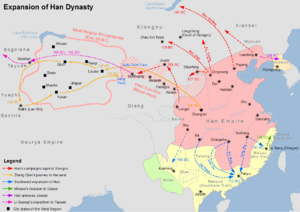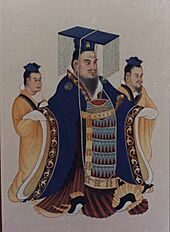Han conquest of Dian facts for kids
The Han conquest of Dian was when the ancient Han dynasty fought against the Dian Kingdom. This happened in what is now Yunnan, China. The Han Empire wanted to expand its control south. In 109 BC, the Han sent an army and the Dian Kingdom became part of the Han Empire.
Quick facts for kids Han campaigns against Dian |
|||||||
|---|---|---|---|---|---|---|---|
| Part of the Southward expansion of the Han dynasty | |||||||
 The expansion of Han dynasty in 2nd century BC |
|||||||
|
|||||||
| Belligerents | |||||||
| Han Empire | Dian Kingdom | ||||||
| Strength | |||||||
| Unknown | 30,000 | ||||||
Contents
About the Dian Kingdom
The Dian was an old kingdom located in what is now Yunnan, in southwestern China. A Han historian named Sima Qian wrote about its beginnings. He said it was founded in 279 BC by Zhuang Qiao. He was a general from the Chu state during the Warring States period.
Zhuang Qiao was sent to the area around Dian Lake for a military mission. But then, his home state of Chu was attacked by the Qin. So, Zhuang Qiao decided to stay in Yunnan. He then created the Dian kingdom. Later, the Qin dynasty was replaced by the Han dynasty. The new Han areas, called Ba and Shu, were right next to Dian.
Why the Han Empire Expanded South
In 135 BC, a Han official named Tang Meng visited the king of Yelang. Yelang was a kingdom near Dian. Tang Meng gave gifts and convinced the king to join the Han Empire. The Han then set up a new area called Jianwei Commandery there.
In 122 BC, Emperor Wu of Han sent groups of explorers to the southwest. They were looking for a way to reach Daxia in Central Asia. One group was welcomed by the king of Dian. But they could not go any further north. Tribes like the Sui and Kunming blocked their path. Other tribes, the Di and Zuo, blocked them in the south.
However, the explorers learned about a kingdom called Dianyue further west. People there rode elephants. They also secretly traded with merchants from Shu.
The Han leaders saw Dian as a place they could add to their empire. Dian was a very important trading hub. It had busy trade routes connecting to modern South and Southeast Asia. The Han rulers really wanted these trade connections. They wanted to get goods like silk, bamboo, iron, tin, and silver. This desire led Emperor Wu to expand the Han dynasty's control further southwest.
The Han Campaigns
In 109 BC, Emperor Wu of Han sent a large military force. This army invaded the Dian Kingdom. After the invasion, the Han Empire took control of the Dian Kingdom.
What Happened After the Conquest
The Dian Kingdom became part of the Han Empire in 109 BC. It was a "tributary state," meaning it paid tribute to the Han. Over the next few centuries, the Dian people slowly adopted Han Chinese culture. By the 11th century AD, they had mostly blended in.
Archaeologists have found many artifacts that show this change. They have found mirrors, coins, pottery, and bronze items made in the Han style in Yunnan. Dian artifacts used to look very different from Han items. But by 100 BC, they started to look a lot like Han imports. This shows how the Dian culture was becoming more like Han Chinese culture.
The Dian people became more like the Han Chinese in several ways. The Han Empire used its military power. Many Han Chinese people also moved and settled there. Some Han refugees also came to the area. A new Han area, called Yizhou Commandery, was set up in the former Dian kingdom.
Archaeologists found an imperial seal given by the Han to the king of Dian. This seal proves that Dian surrendered to the Han. The Dian people tried to rebel against Han rule several times. The first two uprisings happened in 86 BC and 83 BC. Another rebellion from 35 BC to 28 BC was stopped by Chen Li, a Han governor.
More fighting happened when Wang Mang took over the Han emperor's throne from 9 to 23 AD. Wang Mang sent armies to the southwest. One army lost 70% of its soldiers due to illness. Another army, with 100,000 men, also had little success. Rebellions also broke out in 42–45 AD and 176 AD.
During the rule of Emperor Ming of Han (57–75 AD), the Han Empire expanded even further west of Dian. They created a new commandery called Yongchang. In 114 AD, Dian tribes living west of Yuexi/Yuesui Commandery accepted Han rule. Later, Emperor Huan of Han (146–168 AD) started a campaign to spread Han Chinese ethics and culture to the Dian tribes. This process is called "sinicization."
 | Isaac Myers |
 | D. Hamilton Jackson |
 | A. Philip Randolph |


